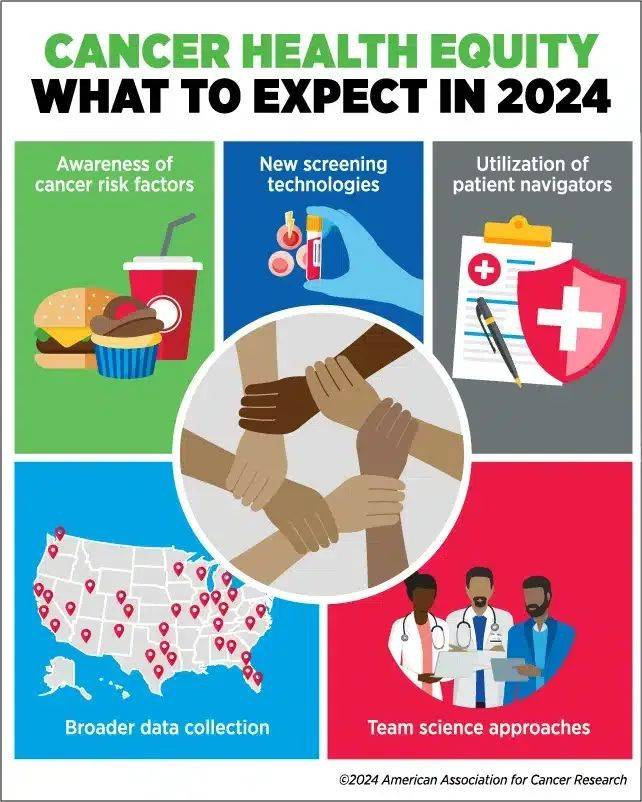
以下内容原文发布于AACR官方博客《Cancer Research Catalyst》, 中文内容仅做参考,请点击文末“阅读原文”,阅览原文内容。
新的一年到来之际,AACR邀请了四位专家,从各自的领域出发预测了2024年癌症研究可能取得的进步。作为四篇系列文章的第二部分,本文将与您分享Robert A. Winn博士(MD,AACR会士)关于实现健康公平的相关观点。
随着近几十年来癌症治疗领域取得的进步,美国的癌症死亡率已大幅下降,但遗憾的是,民众对这一进步的感受并
不一致
。与城市居民或经济条件优越的人相比,农村或资源匮乏人群的患癌和死于癌症的风险仍处于较高水平。
尽管挑战重重,但 Robert A. Winn博士(MD,AACR会士) 相信,2024年取得的一些进展将使癌症治疗更具公平性。
了解更多内容,请阅读以下原文。
Experts Forecast 2024, Part 2: Achieving Cancer Health Equity
In anticipation of the new year, we asked four experts to predict the advances we might see in 2024 in their respective fields. In part 2 of this four-part series, we’ll share thoughts from Robert A. Winn, MD, FAACR, on efforts to achieve health equity. (Check out part 1 featuring predictions from Catherine J. Wu, MD, FAACR about cancer vaccines.)
Cancer mortality in the United States has dramatically reduced thanks to advances in recent decades, but the progress has, unfortunately, been felt unevenly . Individuals from minority, rural, or under-resourced communities are still more likely to develop and die from cancer than their white, urban, or economically privileged counterparts.
Despite the challenges, Robert A. Winn, MD, FAACR , is confident that some headway in 2024 will make cancer care more equitable.
CANCER PREVENTION AND SCREENING

Part of this progress will be through prevention and screening, he noted. He is excited about the potential of new screening technologies—such as multicancer early detection tests and other forms of liquid biopsy —to detect cancers earlier when they are more easily treated, but he acknowledged that making sure all populations have access to these technologies will remain a challenge.
“Historically, whenever there’s a new innovation, it does not lead to impact for all people equally,” said Winn, who is the director and Lipman Chair in Oncology at VCU Massey Comprehensive Cancer Center. “If we’re not cognizant of that, we will continue to create the same inadvertent disparities.” Winn, however, is optimistic that increased awareness of the problem will help reduce such inequities.
“There are now people at the table who weren’t there before, and these are the people from the health equity field,” he noted. “It gives me hope that new technologies will have a more equitable impact than they have in the past.”
Moreover, he expects increased awareness in 2024 about the importance of HPV vaccination, sleep, and access to healthy food in preventing cancer.
Getting people screened and vaccinated is an ongoing struggle, he said, but he believes recent years have led to some progress. “As we are coming out of the COVID era, there seems to be more acceptance of vaccines—at least on the ground level—and willingness in using vaccines to prevent HPV-related cancers,” Winn said.

PATIENT NAVIGATION AND CLOSING DATA DESERTS
Winn also believes patient navigation services will be more heavily used in 2024, bolstered by newly announced reimbursements from the Center for Medicare and Medicaid Services (CMS) that will make these tools more widely accessible to patients with cancer.
“Without navigators to help with the logistics, most people struggle to get the right screenings, to get the right treatment, to enroll in the right clinical trials,” he explained, noting that these hurdles can exacerbate existing disparities. “The reality is that many patients can’t effectively use navigation services unless they’re reimbursed.”
Further, he expects greater awareness of “data deserts” and increased efforts to fill in these deserts in 2024.
“There is very little data on many underserved, at-risk communities, both rural and urban, which makes it nearly impossible to identify the issues, much less develop interventions to reduce cancer incidence or mortality,” Winn said. “There is a whole field now trying to understand why we do not have data on certain groups and developing ways to get more information. This will be key as we enter the era of big data and generative artificial intelligence/machine learning.”
NEXT GENERATION OF SCIENTISTS
Finally, Winn is excited about the impact the next generation of scientists will make in 2024 and beyond.
“For the first time, we have groups of young clinical trialists who have been trained to not only think about designing and executing a trial, but also about things such as large community asset mapping to ensure the trial enrolls a wider population,” he said. (Winn is the namesake and codirector of the Robert A. Winn Diversity in Clinical Trials: Design and Implementation of Clinical Trials Workshop . This workshop, a key AACR initiative now in its third year, trains young investigators in trial design, implementation, and community engagement to diversify clinical trial recruitment.)
“What I love about these new researchers is that they are less siloed and more willing to take a multipronged approach to address disparities,” Winn said, noting that he is already seeing more collaborations among scientists from various fields, an approach he believes is the key to progress.
“In 2024, I’d like more scientists to recognize that they don’t have to carry the weight of addressing disparities alone. Let’s acknowledge that we need a team: discovery scientists who come up with the innovations and implementation scientists who know how to get the innovation out to the community and measure its impact.
“This is how we get innovations to more people.”
更多内容,请点击“阅读原文”
排版编辑:肿瘤资讯-Astrid











 苏公网安备32059002004080号
苏公网安备32059002004080号


